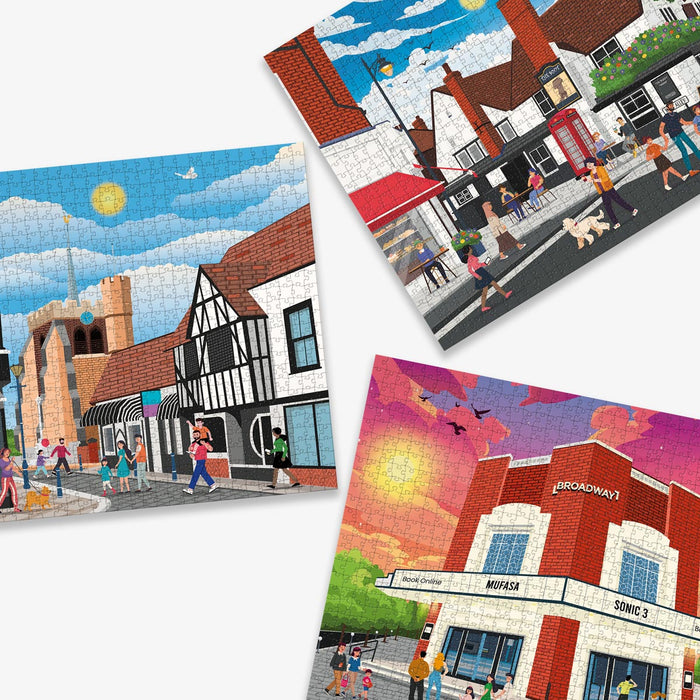Introduction
In a world filled with screens and constant distractions, the benefits of jigsaw puzzles stand out as a timeless form of entertainment and relaxation. From childhood playtime to leisurely evenings spent with loved ones, the appeal of puzzling transcends generations and continues to capture the hearts and minds of people around the world. In this article, we'll explore the myriad benefits of solving jigsaw puzzles, from enhancing cognitive function to fostering family connections.
In the history of jigsaw puzzles, they have long been celebrated for their ability to challenge the mind and stimulate cognitive skills. However, their appeal goes beyond mere mental exercise; they also offer a sanctuary for stress relief and mindfulness. Furthermore, engaging in puzzling activities with family members creates lasting bonds and cherished memories. Let's delve deeper into each of these aspects to uncover the profound benefits of puzzle-solving.

Cognitive Benefits of Jigsaw Puzzles
Solving jigsaw puzzles is like giving your brain a workout. It engages a variety of cognitive skills, including problem-solving, spatial reasoning, and pattern recognition. When faced with a pile of seemingly random pieces, puzzlers must use their analytical abilities to identify connections and assemble the puzzle into a coherent image.
Furthermore, research has shown that engaging in mentally stimulating activities like puzzle-solving can promote neuroplasticity, the brain's ability to form new connections and adapt to changing circumstances. This, in turn, can lead to improvements in cognitive function and memory, particularly in older adults. Studies have demonstrated that regularly engaging in activities that challenge the brain, such as solving puzzles, can help delay cognitive decline and reduce the risk of age-related cognitive disorders like dementia.
The educational benefits for children solving jigsaw puzzles can be especially beneficial for cognitive development. Puzzles encourage children to use their problem-solving skills and spatial awareness, while also enhancing their fine motor skills and hand-eye coordination. Additionally, puzzles provide a fun and engaging way for children to learn about shapes, colours, and visual patterns.
Stress Relief and Mindfulness
In today's fast-paced world, stress has become an all-too-common companion for many people. Fortunately, puzzle-solving offers a welcome respite from the pressures of daily life. Engaging jigsaw puzzles for adults can act as a form of meditation, allowing individuals to quiet their minds and focus their attention on the task at hand.
As puzzlers immerse themselves in the process of sorting and assembling pieces, they enter a state of flow—a state of complete absorption in an activity where time seems to stand still and worries fade away. This sense of flow can be deeply calming and therapeutic, providing relief from stress and anxiety.
Moreover, completing a puzzle provides a tangible sense of accomplishment. The moment when the final piece clicks into place and the image comes together is immensely satisfying, boosting mood and self-esteem. This feeling of achievement can carry over into other areas of life, empowering individuals to tackle challenges with confidence and resilience.
Furthermore, puzzle-solving requires a high level of concentration and attention to detail, making it an ideal activity for promoting mindfulness. By focusing on the shapes, colours, and patterns of the puzzle pieces, puzzlers cultivate a sense of presence and awareness of the present moment. This mindfulness practice can help individuals develop greater clarity of thought, emotional stability, and overall well-being.
In conclusion, solving jigsaw puzzles offers a multitude of benefits for the mind and body. From enhancing cognitive function and memory to providing stress relief and promoting mindfulness, puzzling is a versatile and enjoyable activity that can improve quality of life. In the second half of this article, we'll explore how solving puzzles can strengthen family bonds and create lasting connections across generations.
Family Bonding Through Puzzling
Family bonding activities play a crucial role in strengthening relationships and creating cherished memories. Whether it's sharing a meal together, going on a family outing, or engaging in a favorite hobby, spending quality time with loved ones fosters a sense of connection and belonging within the family unit. Jigsaw puzzles offer a unique opportunity for families to come together and enjoy shared experiences, promoting communication, teamwork, and problem-solving skills in the process.

In today's fast-paced world, families often find themselves pulled in multiple directions, juggling work, school, and other commitments. However, prioritising family bonding activities is essential for nurturing strong relationships and creating a sense of unity within the family. Engaging in activities that encourage collaboration, communication, and shared experiences helps strengthen bonds and create lasting memories that families can treasure for years to come.
Solving jigsaw puzzles as a family provides an opportunity for meaningful interaction and collaboration. As family members work together to assemble the puzzle, they must communicate effectively, share ideas, and support one another through challenges. This collaborative effort fosters a sense of teamwork and encourages family members to work towards a common goal and enphasises the benefits of jigsaw puzzles.
Additionally, puzzle-solving promotes problem-solving skills as family members strategise and plan their approach to completing the puzzle. Whether it's identifying edge pieces, sorting by color, or tackling specific sections of the puzzle, family members must use critical thinking and problem-solving skills to progress towards completion. By working together to overcome obstacles and achieve success, families build confidence and resilience that extends beyond the puzzle-solving experience.
To ensure that puzzle-solving remains a fun and inclusive activity for the whole family, consider the following tips:
- Choose puzzles with themes or images that appeal to everyone in the family.
- Set aside dedicated time for puzzle-solving sessions, such as a family game night or weekend afternoon.
- Create a comfortable and inviting workspace with ample lighting and seating for everyone.
- Encourage family members to take on different roles, such as sorting pieces, assembling edges, or focusing on specific sections of the puzzle.
- Offer praise and encouragement to family members as they make progress on the puzzle, celebrating each milestone along the way.
- Make puzzle-solving a social event by playing music, sharing snacks, or engaging in conversation while working on the puzzle.
By following these tips, families can ensure that puzzle-solving remains an enjoyable and inclusive activity for all ages, with the main benefit of jigsaw puzzles is fostering a sense of togetherness and camaraderie.
Tips and Strategies for Successful Puzzle-Solving
Successfully completing a jigsaw puzzle requires patience, focus, and a strategic approach. Whether you're a seasoned puzzler or new to the world of jigsaw puzzles, here are some tips and strategies to help you tackle even the most challenging puzzles with confidence:
For beginners, choosing the right puzzle can make all the difference in ensuring a positive puzzling experience. Start by selecting a puzzle with a manageable number of pieces and a theme or image that appeals to you. Consider factors such as difficulty level, image complexity, and puzzle size when making your selection.
Once you've chosen a puzzle, set up a comfortable workspace with plenty of room to spread out and work on the puzzle. Make sure you have good lighting and a flat surface to work on, such as a table or puzzle board. Organise your puzzle pieces by sorting them into separate piles based on color, pattern, or edge pieces, making it easier to locate the pieces you need as you assemble the puzzle.

When starting a new puzzle, it can be helpful to begin by assembling the edge pieces to create a frame for the puzzle. Look for pieces with straight edges and distinct shapes, as these are likely to be edge pieces. Once you've assembled the edges, focus on sorting the remaining pieces by color, pattern, or distinctive features to help you identify where each piece belongs.
As you work on the puzzle, try to identify key sections or areas of interest within the image, such as a prominent object or recognizable landmark. Start by assembling these sections first, then work your way outwards to fill in the surrounding pieces. Remember to take breaks and step back from the puzzle periodically to give your eyes and mind a rest, as this can help prevent fatigue and maintain focus.
Puzzle-solving can be a challenging and rewarding endeavor, but it's important to remember that it's okay to take breaks and step away from the puzzle when needed. If you find yourself feeling frustrated or stuck, take a short break to clear your mind and refresh your perspective. Engage in a different activity or simply take a few moments to relax and recharge before returning to the puzzle with renewed focus.
Additionally, don't forget to celebrate small victories and milestones along the way. Whether it's completing a challenging section of the puzzle or finding the perfect piece to fit into place, take a moment to acknowledge your progress and celebrate your achievements. By staying positive and motivated, you'll be able to overcome challenges and enjoy the satisfaction of completing the puzzle.
Conclusion - The Benefits of Jigsaw Puzzles
In conclusion, jigsaw puzzles offer a wide range of benefits for individuals and families alike. From cognitive benefits such as improved problem-solving skills and memory to stress relief and mindfulness, puzzle-solving provides a fun and rewarding way to engage the mind and promote overall well-being. Furthermore, puzzles can serve as a fantastic family bonding activity, fostering communication, teamwork, and shared experiences among family members of all ages.
As you incorporate puzzle-solving into your daily routine, remember to embrace the process and benefits of jigsaw puzzles to enjoy the journey of piecing together each puzzle. Whether you're working on a challenging thousand-piece masterpiece or a simple puzzle with your family, savor the moments of connection and accomplishment that puzzle-solving brings. By prioritizing family bonding activities and engaging in activities that promote mental stimulation and relaxation, you'll create lasting memories and strengthen the bonds that unite you as a family.
So, grab a puzzle, gather your loved ones, and embark on a journey of discovery, connection, and fun. The benefits of jigsaw puzzles await you!



